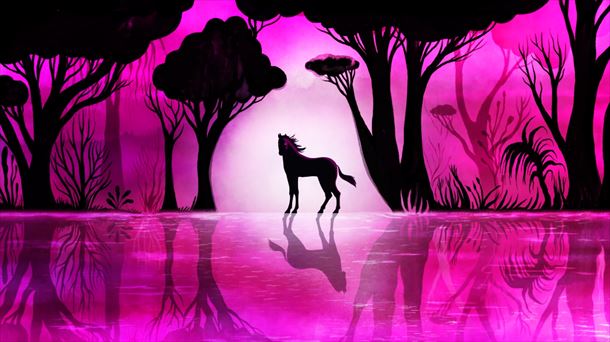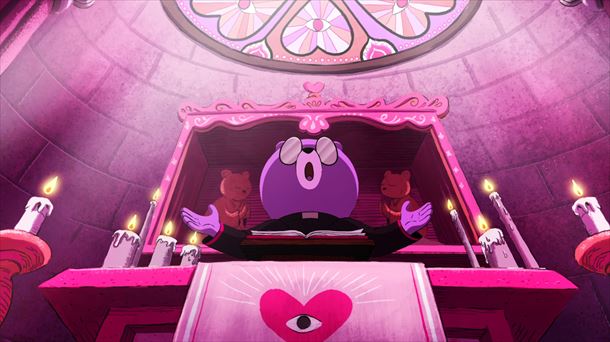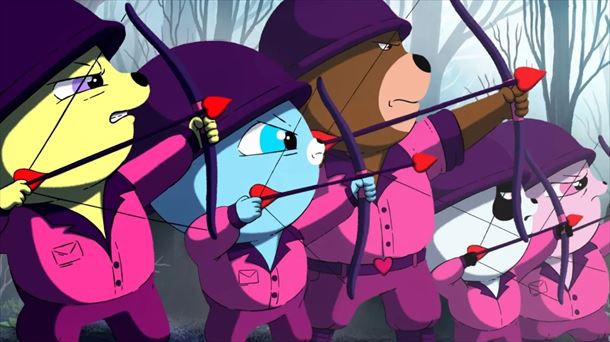“Good unicorn, dead unicorn”, sing vehemently the apparently cuddly teddy bears that star “Unicorn Wars”; is the first contrast of a dark, implacable, wild and mature song (or heartrending cry) of anti-war animation, directed by the Galician filmmaker Alberto Vazquez (“Psychonauts”) and produced by Bilbao-born Ivan Miñambres (Uniko study), in which EITB participates.
Filmmaker and writer David Trueba says that “a country matures when it goes from a children’s story to a story for adults,” and it is palpable that “Unicorn Wars” belongs to this second group. Beneath its light appearance (it begins with pastel colors and a comedic tone that soon turns into a Shakespearean tragedy), the film conceals complexity and looks into the abyss of explaining evil, fanaticism and hatred beyond simplifying and disguising them by enclosing them in the monstrosity.
We talked about “Unicorn Wars” with Ivan Miñambres and Alberto Vázquez, who defines the film as a bastard cross between Apocalypse Now, Bambi and the Bible in which “Hamlet”, “Platoon”, “Paths of glory”, “The grave of the fireflies” and even “Misery” or “In no man’s land” would also fit. See it in theaters, starting today: its severity may leave some body stunned, but, in return, it is sure to broaden more than one mind.
ALBERTO VAZQUEZ, director
The origin of “Unicorn Wars” is your short film “Unicorn Blood” (2013). What was it that made you expand the story of that work in the new film?
It seemed like an interesting idea with possibilities: two bear brothers who hunt unicorns because their blood keeps them beautiful.
When working with fantastic universes with their own imagery, being microworlds, it happens to me that sometimes I want to continue investigating, but the duration of the short film forces me to synthesize the plot. I wanted to continue investigating this story and the relationship between the brothers and the world of unicorns. Also, the short film was quite successful, and that helps to get better financing.
The passage of time helps ideas grow.
What have you been able to add to it now thanks to your own development and the new format?
The idea was to mix my universe as a cartoonist with the war genre and with an epic and religious story. I have always wanted to make a war story, where the characters suffer a descent into hell and a survival story.
This external war between bears and unicorns mixes with an internal war between the two protagonists for the love of their mother, which gradually reveals a family conflict.
At the same time, the contrast with the world of the story, with that naive and multicolored universe, provides an interesting contrast and gives it originality. Religion gives it a transcendental aspect, and takes the story towards a mythological story.

The film talks about fanaticism, trauma and hatred, but it avoids simplism, it tries, unlike the little bears, to explain evil, not to reduce it to “things that a merciless beast does”. Is it hard for us to accept that those who inflict suffering are ordinary and complex people?
Religion is a tool of control. A war with ideology is much more dangerous than one without it. The bears have a story, a legend, and whoever controls the story controls the war.
The idea was to talk about the common origin of all wars that have their point of origin in fanaticism and political and/or religious conflicts. At the same time there is a reflection on the origin of evil.
The religious mysticism on which the bears are based is based on hatred without any support, on living “against something”. Why do you think that speech is so easy to penetrate and is so mobilizing?
The film talks about the dominance of public opinion and, above all, about hatred: hatred of the unknown (unicorn), hatred of peers, bullying, hatred of your own brother.

The tone of the film changes, accompanied by its chromatic context, from comedy to the most brutal war and psychological drama. How have you raised the visual framework of the story that accompanies this dramatic transition?
“Unicorn Wars” is a story of contrasts. It looks like a comedy, but in reality it is a sad story, a drama, which then gives way to a horror story. The contrasts are present in the entire concept of the film: cute against sinister, good against evil, man against nature.
The idea was to provoke emotions, make people uncomfortable, laugh and cry.
The film gives no respite to the viewer. What kind of audience have you thought about, if any, when writing the script?
Actually, I just make the movie that I would like to see. I think about the audience because I want it to be well narrated and entertaining but at the same time have artistic elements.
I think that this film will appeal to people who like fantasy, horror, animation and auteur films. It’s not a commercial film, but I do think it can have a wide audience.
What future do you wish for the film after its time at the Sitges festival and its theatrical release this Friday?
The best of futures. I would like it to be seen, for people to recover theaters and for it to be a movie that is remembered for some element: a scene, a character or the ending.
The film, although it may be a minority because it is animation for adults, will be released in Japan, the US, France, England, etc… I hope it finds its place. In the end many minorities form a majority.

IVAN MIÑAMBRES (director)
Why did you bet on the “Unicorn Wars” project?
After working with Alberto Vázquez for more than 10 years, as soon as I read the script I had blind faith in leading this production.
‘Unicorn Wars’ is a movie that should exist. A commitment to an ambitious, quality animated film that deals with adult themes.
It is one more example that animation is CINE in capital letters. And that fantasy is used, among other things, to speak allegorically about current problems.
How is a three-way co-production project conceived and developed?
Like any risky project, the process to make it a reality has been arduous and complex. Above all, it was extremely difficult to obtain the necessary financing to do it from Galicia and Euskadi.
Once involved in production, coordinating more than 250 people during a pandemic was not easy either… but the professionalism and the technical, artistic and human quality of the team made the final result even better than what we initially planned.
Why do people have to go to see the movie at the cinema starting on Friday?
We are in a year in which it has become clear that another cinema is possible. “Unicorn Wars” shows that animation is not far behind.
If someone wants to live a unique, provocative experience that will not leave them indifferent, I would encourage them to go to the cinemas.
Source: Eitb
I am Moises Cosgrove and I work for a news website as an author. I specialize in the market section, writing stories about the latest developments in the world of finance and economics. My articles are read by people from all walks of life, from investors to analysts, to everyday citizens looking for insight into how news will affect their finances.
